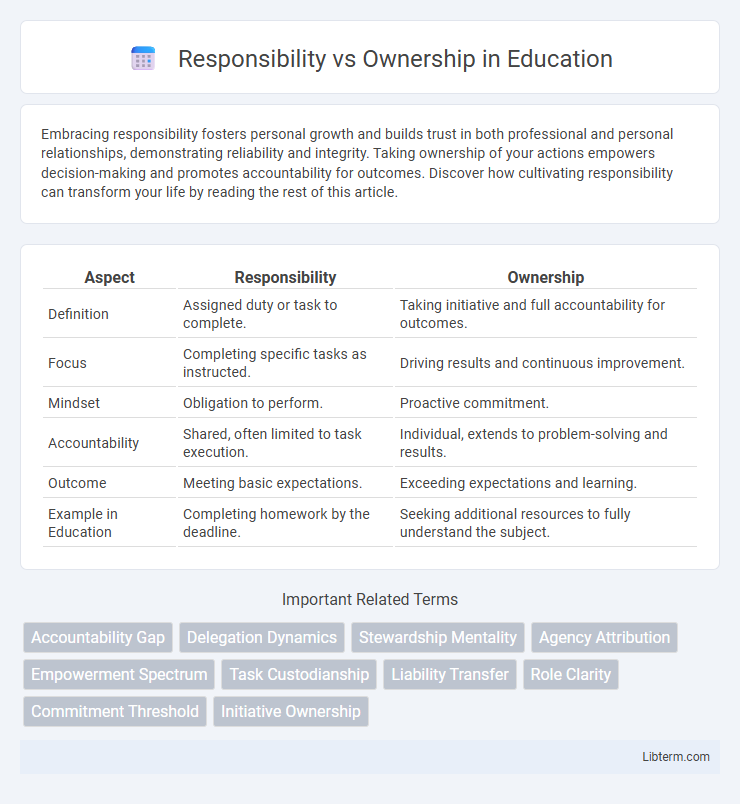Embracing responsibility fosters personal growth and builds trust in both professional and personal relationships, demonstrating reliability and integrity. Taking ownership of your actions empowers decision-making and promotes accountability for outcomes. Discover how cultivating responsibility can transform your life by reading the rest of this article.
Table of Comparison
| Aspect | Responsibility | Ownership |
|---|---|---|
| Definition | Assigned duty or task to complete. | Taking initiative and full accountability for outcomes. |
| Focus | Completing specific tasks as instructed. | Driving results and continuous improvement. |
| Mindset | Obligation to perform. | Proactive commitment. |
| Accountability | Shared, often limited to task execution. | Individual, extends to problem-solving and results. |
| Outcome | Meeting basic expectations. | Exceeding expectations and learning. |
| Example in Education | Completing homework by the deadline. | Seeking additional resources to fully understand the subject. |
Understanding Responsibility: Key Definitions
Understanding responsibility involves recognizing obligations assigned to an individual or group to complete specific tasks or duties. Responsibility is often defined as the duty to perform or oversee particular actions, ensuring accountability for outcomes within a role or project. Clear identification of responsibilities helps in setting expectations and measuring performance effectively across organizational structures.
Defining Ownership: What Sets It Apart
Ownership distinguishes itself from responsibility by embodying a proactive commitment to outcomes beyond assigned tasks, emphasizing accountability for the entire process and results. It involves taking initiative, anticipating issues, and driving solutions without awaiting instructions, reflecting a deeper level of engagement and empowerment. This mindset fosters innovation and trust within teams, as owners prioritize success through sustained dedication and strategic oversight.
The Core Differences: Responsibility vs Ownership
Responsibility involves being assigned specific tasks or duties, requiring individuals to complete what is expected of them. Ownership goes beyond responsibility by involving a proactive commitment to outcomes, including accountability for both successes and failures. The core difference lies in ownership embracing initiative and personal investment, whereas responsibility is limited to fulfilling predefined roles.
Why Ownership Drives Better Results
Ownership drives better results by fostering a deeper commitment and proactive mindset, as individuals see outcomes as directly tied to their efforts. When people take ownership, they are more likely to identify problems early, innovate solutions, and sustain motivation through challenges. This heightened accountability enhances productivity, quality, and overall team performance beyond merely fulfilling assigned responsibilities.
Responsibility in Team Dynamics
Responsibility in team dynamics refers to the specific duties assigned to individuals to ensure tasks are completed effectively and on time. Clear delineation of responsibility fosters accountability and helps prevent overlaps or gaps in task execution. Teams with well-defined responsibilities improve collaboration by aligning efforts toward shared goals and enhancing overall productivity.
Cultivating an Ownership Mindset
Cultivating an ownership mindset involves employees taking proactive initiative, embracing accountability beyond assigned tasks, and driving results with a long-term perspective. This mindset shifts focus from merely fulfilling responsibilities to actively seeking solutions and improvements, fostering innovation and resilience within organizations. Developing ownership accelerates personal growth and enhances team performance by creating a culture of trust and empowerment.
Common Pitfalls: When Responsibility Is Not Enough
Responsibility without ownership often leads to missed deadlines and lack of accountability, as individuals may fulfill tasks superficially without ensuring successful outcomes. Common pitfalls include unclear expectations, fragmented communication, and avoidance of proactive problem-solving, which hinder team performance and project success. Emphasizing ownership transforms responsibility into active stewardship, fostering commitment and driving continuous improvement.
Leadership’s Role in Fostering Ownership
Leadership plays a crucial role in fostering ownership by clearly defining expectations and empowering team members to take initiative and make decisions. Effective leaders create an environment where accountability is encouraged, and individuals feel trusted to deliver results beyond their assigned responsibilities. By promoting transparency and offering support, leadership transforms responsibility into a deeper sense of ownership that drives innovation and performance.
Measuring Success: Responsibility vs Ownership Outcomes
Measuring success in responsibility versus ownership involves evaluating accountability levels and tangible outcomes. Responsibility often results in task completion metrics and adherence to deadlines, while ownership drives proactive problem-solving and innovation, leading to enhanced performance indicators. Organizations benefit from tracking both to balance efficiency with initiative, ensuring sustainable growth.
Practical Steps to Shift from Responsibility to Ownership
Shifting from responsibility to ownership involves proactive mindset changes, such as setting clear personal goals aligned with team objectives and anticipating challenges before they escalate. Implementing accountability techniques like regular self-assessments and seeking feedback encourages ownership by fostering a solution-oriented approach rather than just task completion. Emphasizing autonomy in decision-making and taking initiative to improve processes leads to a stronger sense of ownership and drives overall performance improvement.
Responsibility Infographic

 libterm.com
libterm.com